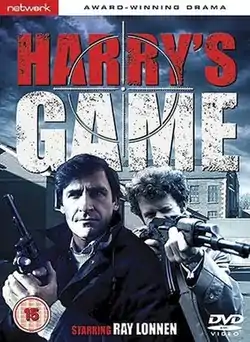Harry's Game
Harry's Game is a British television drama mini-series made by Yorkshire Television for ITV in 1982, closely based on the 1975 novel of the same name by Gerald Seymour. Apart from brief scenes, it is set in and around Belfast in the Troubles.
| Harry's Game | |
|---|---|
 | |
| Genre | Spy thriller |
| Based on | Harry's Game (novel) |
| Written by | Gerald Seymour |
| Directed by | Lawrence Gordon Clark |
| Starring | Ray Lonnen Derek Thompson |
| Theme music composer | Clannad |
| Country of origin | United Kingdom |
| Original language | English |
| No. of episodes | 3 |
| Production | |
| Producer | David Cunliffe and Keith Richardson[1] |
| Running time | 180 minutes 2 hr 40 min (160 min) (DVD) (UK) |
| Release | |
| Original network | ITV |
| Original release | 25 October – 27 October 1982 |
Its lead actors were Ray Lonnen, Derek Thompson and Benjamin Whitrow.
The drama is noted for its closing music by the Irish musical group Clannad titled "Theme from Harry's Game" used in trailers and later commercially released, reaching the top five of Irish and British singles charts, bringing the band its first major international exposure. The drama, filmed in West Yorkshire, Northern Ireland and the Republic of Ireland has been released under five other names in other countries.
Synopsis
The British government cabinet minister Henry Danby is murdered by an IRA gunman, Billy Downes, in front of his wife and children outside his home in London. Downes then escapes to Belfast and army officer Harry Brown is sent undercover into Belfast's Catholic community to track down the assassin.[2] Brown is chosen for the mission because he is an Ulsterman who has previously done similar work in Oman.
Given the cover identity of merchant seaman Harry McEvoy, he finds lodgings in the Falls Road area and secures a job in a scrapyard. He dates a Catholic, Josephine Laverty, and unknowingly encounters Downes in a local club, which is raided by the British Army. A British soldier recognises Harry but ignores him and arrests Downes, who is interrogated but set free. Harry tips off his superiors that the killer was at the club and that Theresa, a girl at whose family home Billy stayed the night while on the run, knows his name. Theresa is arrested, but caught between the police interrogator Rennie and her fear of the IRA if she talks, she hangs herself in prison before revealing Downes' identity. When Josephine realises that Harry must have passed on the information about Theresa, she tells him to leave while he can, but he refuses, saying Danby's killer cannot be allowed to get away with the murder.
A waiter overhears two army officers discussing Harry's presence in Belfast while eating at his restaurant. He reports Harry's presence to the IRA, and the local IRA boss starts checking all new arrivals, including Harry.
The IRA start to hunt Harry down.[2] With two other gunmen, Downes ambushes Harry, who shoots the gunmen and forces a passing driver to chase their car as Downes escapes. Harry follows Downes to his own home, which is under surveillance by the army. Harry shoots Downes in the street in front of his wife and is himself shot by the soldiers watching the house, who think that he is a terrorist. Injured and bleeding in the street, Harry is confronted by Downes's wife, who then shoots him in the head using Harry's own revolver.
The film closes with a narrator reading a part of a poem written by the daughter of an IRA victim (William J. Staunton, a 46-year-old British magistrate shot dead by the IRA on 25 January 1973, near Saint Dominic's School, Falls Road): "Don't cry, Mummy said. They're not real, but Daddy was, and he's not here. Don't be bitter, Mummy said. They've hurt themselves much more. They can walk and run, Daddy can't."
Cast
- Ray Lonnen as Harry Brown
- Benjamin Whitrow as Davidson
- Nicholas Day as Bannen
- Geoffrey Chater as Col. George Frost
- Sean Caffrey as Insp. Howard Rennie
- Derek Thompson as Billy Downes
Production
Locations
Most of the time filming was spent in Leeds, in Yorkshire, England, on now-demolished housing of Meanwood and at Leeds Studios. This stood in for Northern Ireland.
The rest of footage, filmed west of the Irish Sea, includes shots of the Falls Road, broader views as where Harry is frisked on entry to Belfast city centre (there was a permanent checkpoint for pedestrians there for many years) and the final scenes overlooking the cityscape were in Holywood, County Down and close to the military/MI5 barracks. Scenes were also filmed in the south of County Dublin including in Ballybrack.
Music
Clannad's closing music became an international breakthrough. Incidental music was sampled or created by Mike Moran.[3]
Broadcast and distribution history
The series screened on the ITV network as three 52-to-54 minute episodes over consecutive nights from 25 to 27 October 1982, and was later edited into a single 130-minute programme titled Harry's Game - The Movie.
- Outside of Britain and Ireland
- The film was not widely seen in the US or widely available on video; sold in Canada titled Belfast Assassin. The original, unedited three-part serial was released on DVD in the United Kingdom in 2005.[4]
- The box set of DVDs has been distributed in the Netherlands and Belgium.[4][5]
- In Finland it has featured as Ajojahti and Vastaisku.[4]
- In France Harry's Game was released in 2008. Its DVD bears title Le tueur de Belfast.[4]
- In Germany it was released before unification of Germany as Das tödliche Patt[4]
Character redeployment
Rennie appears in Seymour's other books The Journeyman Tailor and Field of Blood (and screen adaptation The Informant).
References
External links
- Harry's Game at IMDb
- Harry's Game at TV.com